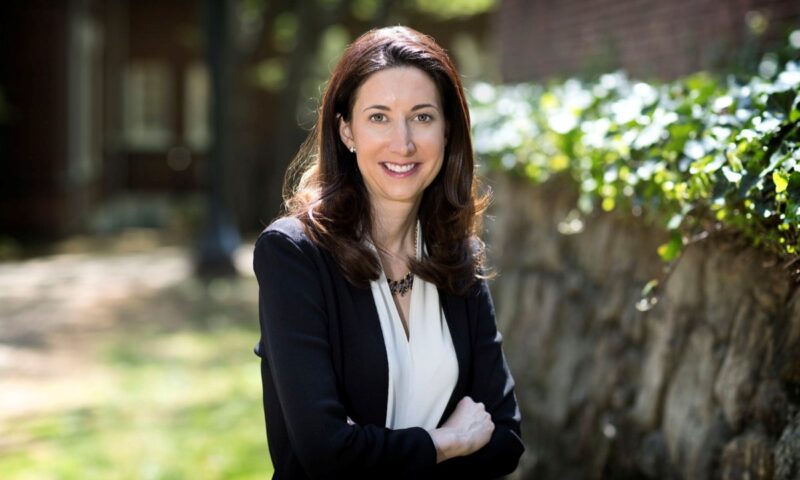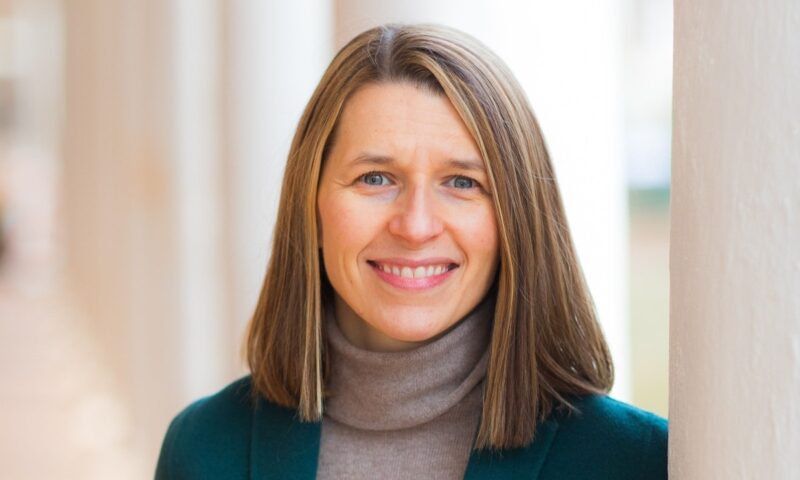Dorothy “Dot” Kelly, UVA’s Robert B. Hardaway, Jr. Lecturer of Personal Finance, is passionate about the benefits of financial literacy. Highly regarded for her expertise on the subject, Kelly has been regularly invited to speak to different audiences across Grounds since 2015, when she joined the University to teach the undergraduate elective course Personal Finance to non-Commerce students at McIntire.
As we close out January, the month that heralds many of our myriad desires to better ourselves, it’s also an appropriate time to recognize Financial Wellness Month, with some practical advice. We reached out to Kelly to ask her about steps that anyone can take to enhance their financial well-being—which she also says that, by extension, will improve well-being overall.
“Financial well-being has four components,” she explains, noting that the factors are ultimately concerned with managing money, being ready for emergencies, planning for the long term, and having the freedom of choice to live our best lives the way that we want.
Below, Kelly details five personal finance habits that everyone should incorporate into their lives to get their finances in order and to preserve and encourage their own financial well-being.
Step One: Take Control Over Your Day-to-Day and Month-to-Month Finances
“If you don’t already have a good understanding of where your money goes, start today,” Kelly says. “Write down every expenditure—in a notebook, on your phone, in an app, whatever you prefer—to see where you are spending money and where you can trim expenses.”
To improve financial net worth, she implores people to challenge themselves by cutting out unnecessary expenses and high-cost debt such as the kind that results from carrying a large balance on high-APR credit cards. “Make it a game, with the reward being a measurable improvement in your balance sheet and your financial health,” Kelly suggests.
Step Two: Improve Your Ability to Absorb a Financial Shock
“Life happens. To deal with the leaky roof, the unexpected car repair, illness, future economic recessions, job loss, etc., people need an emergency fund that they can access quickly,” Kelly says.
Though she points out that the size of an emergency fund depends on factors that range from age to occupation and individual circumstances, she believes that for people early in their professional lives, an emergency fund of three to six months of living expenses is often sufficient to cover the unexpected or monthly bills that need to be paid between jobs. “A young analyst can often find another analyst position with similar compensation fairly quickly—within weeks or a few months,” she notes.
Kelly says that the more senior position a person holds, the more cash they should have available in their emergency fund.
“Senior workers often have more financial responsibilities, including dependents, and are competing for far fewer positions. A senior manager may take much longer to find a similar position—multiple months, perhaps even a year or more, if similar positions even exist,” she warns. “Some workers in their 50s and 60s will find themselves switching industries or careers and/or accepting lower-paying positions. For these workers, a sizeable emergency fund of 18 to 36 months will reduce stress, increase one’s options, and smooth the transition to the next career phase.”

Dorothy Kelly, a Chartered Financial Analyst and Personal Finance Lecturer at the McIntire School of Commerce. (Photo by Dan Addison, University Communications)
Step Three: Review Your Financial Goals
Are you on track to meet your financial goals? Have your goals changed? Do the recently passed laws affect your goals and ability to reach them?
Kelly explains that the U.S. government passed several pieces of legislation in 2022 that will affect Americans’ finances in 2023 and in the coming years.
“For example, the SECURE Act 2.0, which was included in the omnibus spending bill signed on Dec. 29, 2022, has something for everyone interested in securing financial wellness. Provisions in SECURE 2.0 make it easier for all of us to save and invest for our financial goals through tax-advantaged accounts, including employer-sponsored defined contribution accounts, individual retirement accounts, and 529 education accounts,” she says.
For more specific expenses such as buying a car or fixing your home, Kelly says the Inflation Reduction Act helps to make some of those expenses more economical through tax credits; they cover a variety of energy-related expenditures, including electric vehicles, heat pumps, water heaters, insulation, energy-efficient windows, etc. “Review your financial goals, and then check how the newly passed legislation may make it easier to achieve at least some of them.”
Step Four: Review and Revise Your Financial Plan
Plans, Kelly reminds us, often need to be reviewed and then properly updated. For financial plans, that means looking them over at least annually and whenever something big happens: major life changes, a shift in your personal economic circumstances, or the arrival of new tax laws.
These major life changes—the birth of a child, a divorce, a new job, caring for a senior parent, moving to a new city, and so much more—can impact us at any age. For those moving into retirement, Kelly says that “transitioning from the earning, saving, and investing phase of life to the spending phase of life can be challenging and deserves attention and careful consideration. It pays to have a very long-term view and consider various ways to fund financial goals and different life phases.”
Step Five: Invest in Yourself
Kelly says that securing our financial well-being is perhaps best made possible by a lifelong dedication to investing—in our monetary assets as well as other important aspects of our lives.
“Prioritize your financial well-being by investing early and often. Thanks to the magical effect of compounding, the sooner you start, the better off you will be,” she insists.
And that advice isn’t simply focused on dollars and cents. “Other forms of investment will also contribute to your financial as well as overall well-being. As Ben Franklin said, ‘An investment in knowledge pays the best interest.’”
Kelly maintains that likewise, “investing in healthy habits allows [people] to continue to work, earn, save, invest, and enjoy life for decades to come.”
Finally, she implores us to “invest time and energy in relationships. Research shows that investing in relationships with others is the most significant determinant of long-term well-being.”
To ensure your financial wellness, Kelly says to “invest early and often, enjoy, and thrive.”



